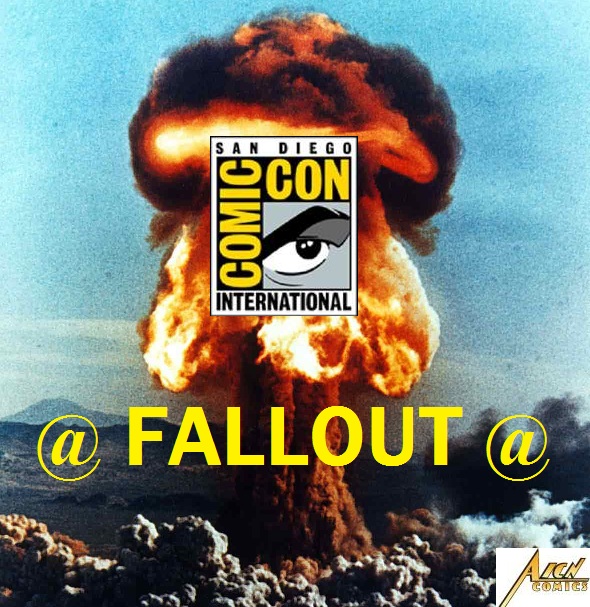
Greetings, folks. Ambush Bug here with the first in a ton of interviews I conducted at the San Diego Comic Con. Special thanks to AICN’s unsung hero, Muldoon, for transcribing all of these back and forthings. Expect a ton of interviews to be released daily until my interview well is dry (and believe me, it’s going to be a while after this con). My first interview was a lengthy chat I had with Marvel’s Chief Creative Officer, Joe Quesada who through the years I have praised and panned for his ballsy and sometimes controversial decisions he has made with my beloved Marvel Universe through the years. Though he was light on spoilers, Joe was heavy on talking about his role as Mayor McCheese at Marvel. Here’s what Joey the Q had to say in our sit down, backstage at the Marvel Booth on the con floor.
@’s by Marvel CCO Joe Quesada!
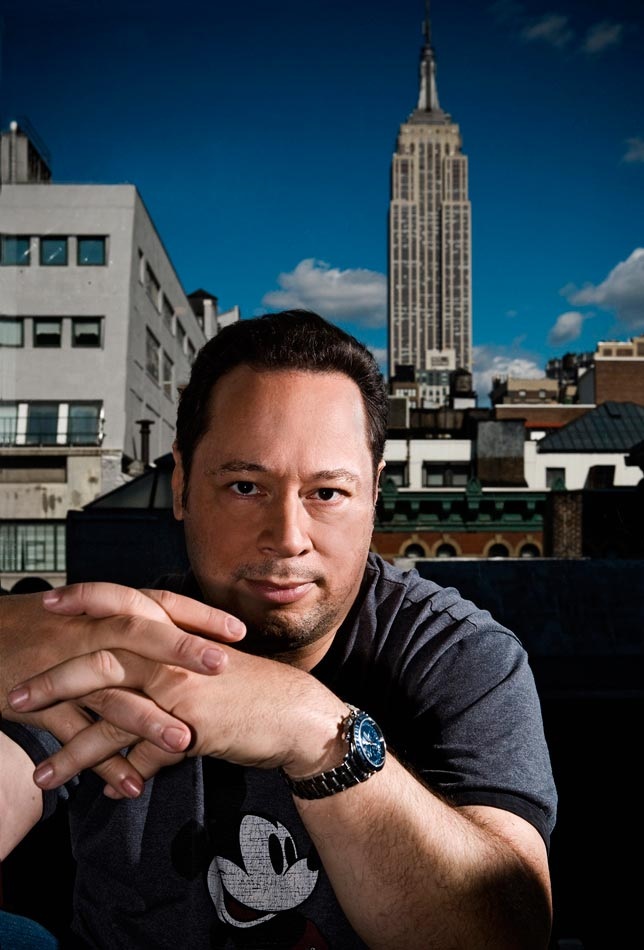 AMBUSH BUG (BUG): Okay, well I am here at the Marvel booth with Joe Quesada. How’s the con treating you thus far?
AMBUSH BUG (BUG): Okay, well I am here at the Marvel booth with Joe Quesada. How’s the con treating you thus far? JOE QUESADA (JQ): I’m doing great, but it’s Thursday, so ask me on Sunday and I’ll let you know how I’m feeling then.
[Both Laugh]
BUG: Okay, well let’s start out just by talking about some of the announcements that you are making on the show. Can you reveal any of that today? I know it’s early in the show and you like to pepper those out a little bit through the next couple of days, but since this isn’t going up until later I didn’t know if you were able to talk about it.
JQ: It’s tough to really talk about right now, but we are going to be talking about a lot of things. We are going to be talking about some special Marvel Studios stuff that’s happening that we are creating for some of our DVD releases. We will be talking about the UTIMATE SPIDER-MAN cartoon that we are working on, which for those of you who are wondering what makes this Spider-Man cartoon significant, because there have been quite a number of Spider-Man cartoons in the past, is that this is the very first one that Marvel itself is producing using Marvel creative talent, so it’s very near and dear to our heart and it has an unusual point of view for Spider-Man and it’s going to be premiering on DXD, so we are really really happy about that. And we’ve got a lot of publishing stuff that we are talking about, things that will be happening after our big FEAR ITSELF event that’s going on currently, where the Marvel Universe will be and we will even be talking about probably DEATH OF SPIDERMAN and what happens after that.
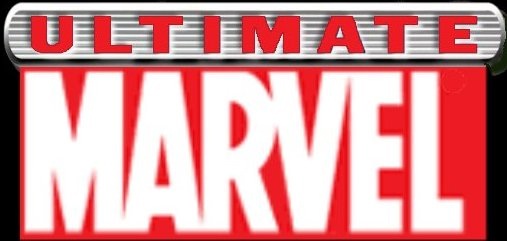 BUG: Yeah, what’s going on with the Ultimate Universe? It seems to be getting smaller and smaller. Is it still going to be going on or what’s going to happen?
BUG: Yeah, what’s going on with the Ultimate Universe? It seems to be getting smaller and smaller. Is it still going to be going on or what’s going to happen? JQ: Oh yeah, absolutely. Here’s what’s really significant about the Ultimate Universe and why people, if they haven’t been paying attention lately, should be paying attention. If you look at the history of the Ultimate Universe when we started it about nine years ago, there were things that we did within the context of the Ultimate Universe that we obviously couldn’t do with the regular Marvel Universe. Those things showed that we could push our characters to certain extents, whether it be with respect to edginess or were characters can actually go. It allows us to be very, very daring and in a lot ways it’s almost a testing ground, because then as we move through Marvel time you’ll see that a lot of the elements that happened in the Ultimate Universe eventually were the precursors to things that would happen in the regular Marvel Universe. But more importantly were a precursor to things that would happen in a Marvel cinematic universe. As you watch IRON MAN and CAPTAIN AMERICA and THOR and the upcoming AVENGERS you will see that there are a tremendous amount of elements in those movies that were really sort of originated in the Ultimate Universe. So now as we are in this sort of new age of the Ultimate Universe. We are doing some amazingly radical things again and while I’m not Nostradamus and I can’t predict things, it wouldn’t surprise me if you see things happening in the Ultimate Universe today that you might see happening in a cinematic universe five, six, seven years from now or even in the regular Marvel comic universe in the next two or three years. So that’s the beauty of it is that we are able to do some really radical things that we normally would have to be very careful with respect to the regular universe.
BUG: Yeah, I’ve noticed the films to have a lot of that kind of Ultimate feel to it, but it still is very honorable to all of the rich history that you guys have had. How do you walk that line?
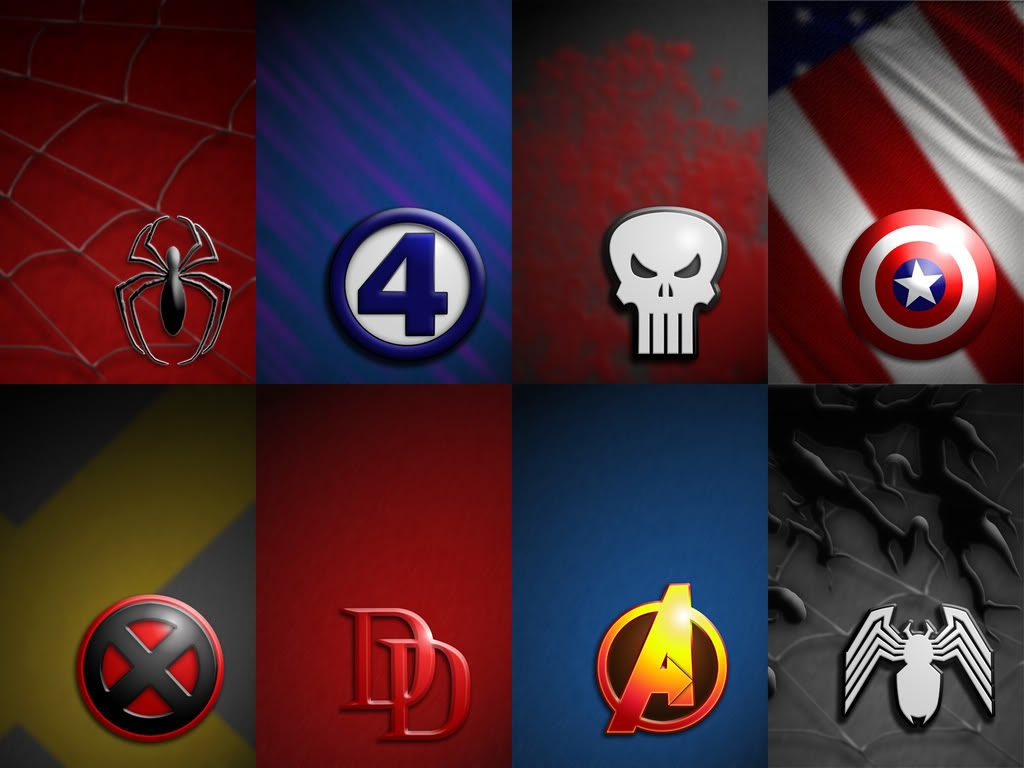 JQ: Well you know the hard part about making these films is that with so many of these characters, there is so much history and such a rich deep continuity and there are legendary storylines depending on which character you look at. So what you want to do is you don’t want to just cherry pick the best of the best, but you want to make sure that it’s a nice blend of some of the best elements of characters in a way that you can then distill it down into a two hour or less movie that major audience can understand right. As comic book readers we come in with a lot of baggage for these characters, so you want to create a story that is accessible to everyone and also does not alienate your hardcore constituency, because those are the people that are really important to us and at the end of the day. They are the ones that get the word out. They are the best marketing program we could ever have, because they have a love and affection for the Marvel characters and the Marvel Universe and I think that’s also why we developed this cinematic universe in which we are leading toward THE AVENGERS movie, which I think is something that has really never been done in movie making before. It’s risky, but I think Kevin Feige and Louis D’Esposito and all of the guys out there at Marvel Studios are just doing an amazing job making sure that these movies are as great as they can be.
JQ: Well you know the hard part about making these films is that with so many of these characters, there is so much history and such a rich deep continuity and there are legendary storylines depending on which character you look at. So what you want to do is you don’t want to just cherry pick the best of the best, but you want to make sure that it’s a nice blend of some of the best elements of characters in a way that you can then distill it down into a two hour or less movie that major audience can understand right. As comic book readers we come in with a lot of baggage for these characters, so you want to create a story that is accessible to everyone and also does not alienate your hardcore constituency, because those are the people that are really important to us and at the end of the day. They are the ones that get the word out. They are the best marketing program we could ever have, because they have a love and affection for the Marvel characters and the Marvel Universe and I think that’s also why we developed this cinematic universe in which we are leading toward THE AVENGERS movie, which I think is something that has really never been done in movie making before. It’s risky, but I think Kevin Feige and Louis D’Esposito and all of the guys out there at Marvel Studios are just doing an amazing job making sure that these movies are as great as they can be.BUG: So what do you think of the CAP film then? You’ve seen it, right?
JQ: Yeah look, I’m obviously biased. I was involved with making the CAP film, but for me as much as I love IRON MAN and THOR, I really, really love CAP. I think CAP is my favorite so far and just because it strikes a cord. It strikes a summer movie cord that I haven’t felt in a very, very long time and it’s got sort of an old time feel, but at the same time it’s very, very modern. You are obviously watching a movie that occurs during WWII, but you sort of lose yourself and forget that you are not in the here and now. It’s got some great twists and turns. Those of us that understand the Cap mythos, we know what those twists and turns are going to be, but I think… I would love to sometime just be the neophyte who is watching the movie and all of a sudden you get to that big turn and you go “Whoa, I didn’t see that coming.” That’s got to be a special feeling, but I’m really really proud of the CAPTAIN AMERICA film and I think the guys at Marvel Studios should be very proud of it as well.
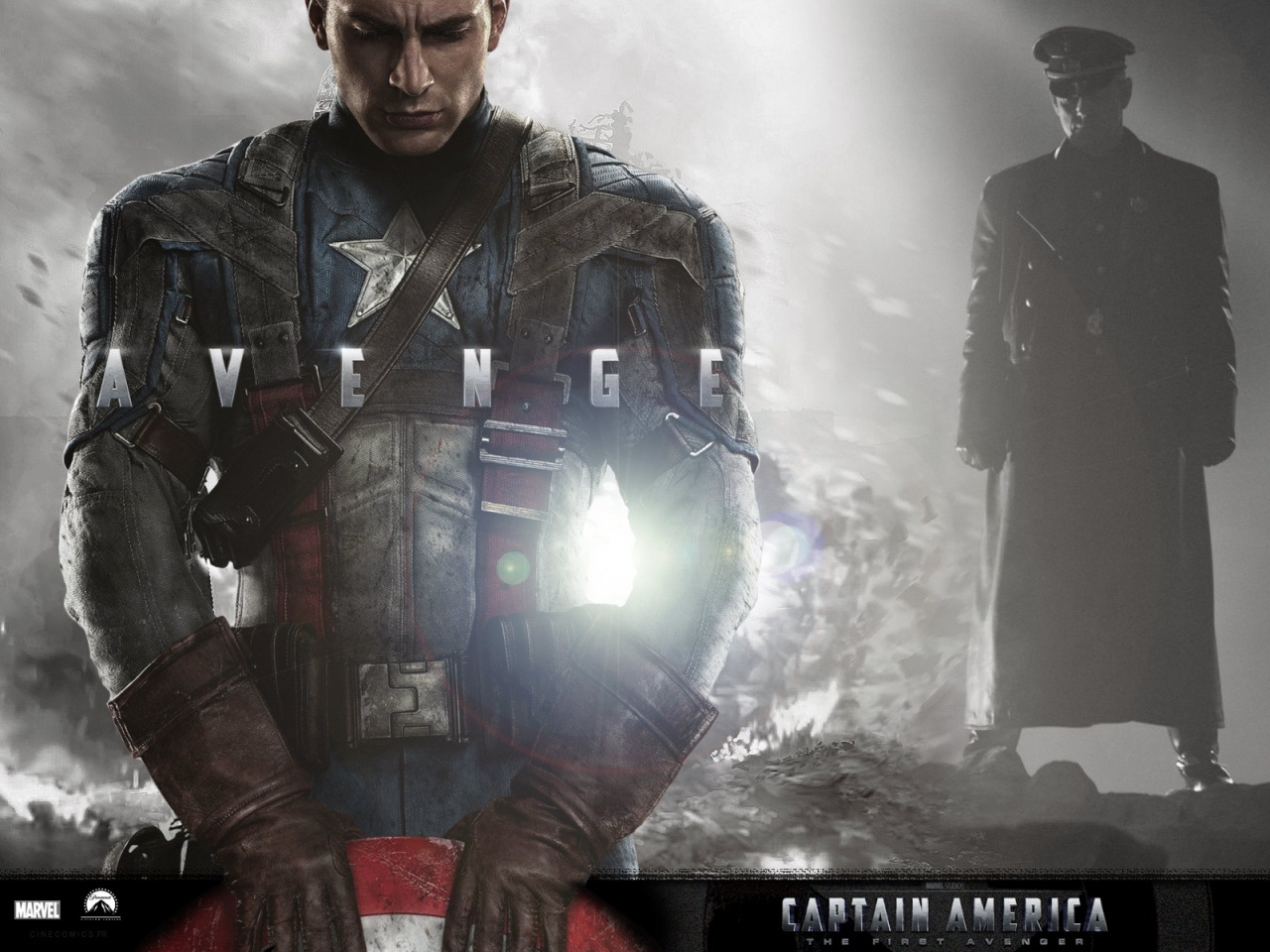 BUG: As soon as this con is over or sometime at the con I’m going to go see it. I can’t wait. It’s the one film I’ve been looking forward to most over the summer. There have been some disappointments along the way, but I just can’t wait to see it.
BUG: As soon as this con is over or sometime at the con I’m going to go see it. I can’t wait. It’s the one film I’ve been looking forward to most over the summer. There have been some disappointments along the way, but I just can’t wait to see it. JQ: And Chris Evans, I can’t say enough about his performance. Chris is known for certain kinds of performances in the movies that he plays, even with respect to Johnny Storm, a little more light hearted and sort of witty, but that’s not what Cap is about and he just really knocks it out of the park and there are moments… I was talking to Kevin Feige a few minutes ago, because I’ve seen the movie a dozen times at this point and there are moments where the camera just cuts to Chris and he doesn’t say anything and there will just be a little gesture where there’s an eyebrow raise or a slight smile, things that he does. It’s the subtext within his performance that I think captures Cap without necessarily going over the top and sort of being a jokester throughout the movie.
BUG: Yeah, so how do you keep the characters that have been around, like Cap who have been here for 60 or 70 years, how do you keep that fresh?
JQ: You know the secret to doing them… We have to start with publishing, because publishing… If Marvel were a wheel, publishing is the hub. Now within publishing the key for us is always dealing with the alter ego of the character. Steve Rogers is more important than Captain America. If we nail the alter ego, if we make Steve Rogers a real person, then when he puts on that costume your heart is with him and you want to follow those adventures. It can’t just be a person in a really cool costume and we then forsake the alter ego, it has to be a real person first and I think that’s been the quintessential Marvel formula from the day that Stan Lee and Steve Ditko sat down and created the idea of Spider-Man and created this amazing little character named Peter Parker. I always say that every Spider-Man realistically could be titled “Peter Parker,” but we call it Spider-Man, because it sells more units. (Laughs) Ultimately we have to tell great Peter Parker stories. If we don’t tell great Peter Parker stories, if we don’t have Peter Parker fans or Spider-Man fans passionate in one way or another about it, then we really have failed our job as storytellers. And that’s been the formula that we followed whether we are doing animation, live action TV, or motion pictures. It’s all about that alter ego and even if you just look at the IRON MAN movie, I mean Tony Stark as played by Robert Downey Jr, at the end of the day whether he puts on the armor or not is inconsequential. You are glued to Tony Stark, his banter, his wit, his relationships with his friends, his relationship with the outside world, that’s really what’s important, hey and then there’s a bonus, he puts on a really cool suit of armor and he goes out there and he kicks some major ass.
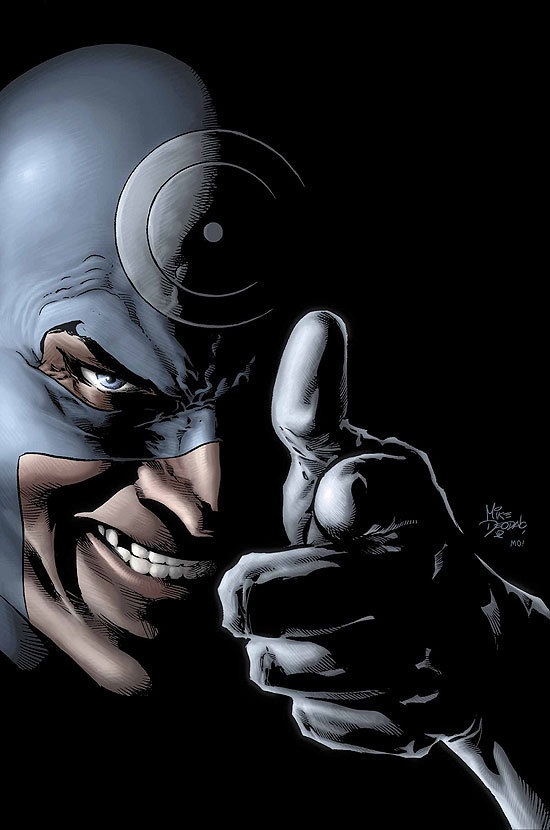 BUG: You mentioned the fans and how hardcore they are, your job… basically you are wearing a bull’s-eye all of the time, so if you do well then the praise is heaped on you and you are doing great, but you are really beat up when something goes wrong or isn’t popular. How do you deal with that kind of pressure day in and day out?
BUG: You mentioned the fans and how hardcore they are, your job… basically you are wearing a bull’s-eye all of the time, so if you do well then the praise is heaped on you and you are doing great, but you are really beat up when something goes wrong or isn’t popular. How do you deal with that kind of pressure day in and day out? JQ: You know what? You have to take it as it comes. I remember by first week as editor in chief, Tom DeFalco came into my office and Tom DeFalco had been the Editor In Chief prior to the person that I took over and Tom gave me some sage advice. He said “Listen, the only advice I could give you as a past EIC is you will have a bull’s eye on your back no matter what you do. When things go great, people will hate you. When things go bad, people will hate you. If you are not willing to accept that burden, then really, don’t take this job.” And I kind of knew it going in, but I thought it was really important advice. It’s just a job, it’s just what your job entails, but at the same time I get to be involved with so many wonderful things. I get to work with such amazing creators. It’s all a wash and look at the end of the day if there’s a silence out there, then I know I’m doing a terrible job. If there’s people out there that are angry, upset, ecstatic, over the moon, as long as they are feeling something passionate then I know we are doing something, because there isn’t a single Marvel story that we can do that’s going to please everyone you know. I could have Wolverine give birth to a dozen of the cutest golden retrievers ever in the history of comic bookdom and someone will hate those cute little golden retrievers and ask for them to be drowned after their birth, okay? (Laughs) It’s just when you make stories and people feel so passionate about these characters it’s going to happen. It’s funny, when you read internet comments about the things that we do and this isn’t just about me, it’s about our creators, our editors, fans will talk about those of us that are creating the characters as though we are two dimensional comic book characters twirling our mustaches, but they will talk about our characters as though they are 3D flesh and blood real people with real feelings and real family and real friends and you know what? At the end of the day it’s kind of the way it’s supposed to be. If they do that, win, right?
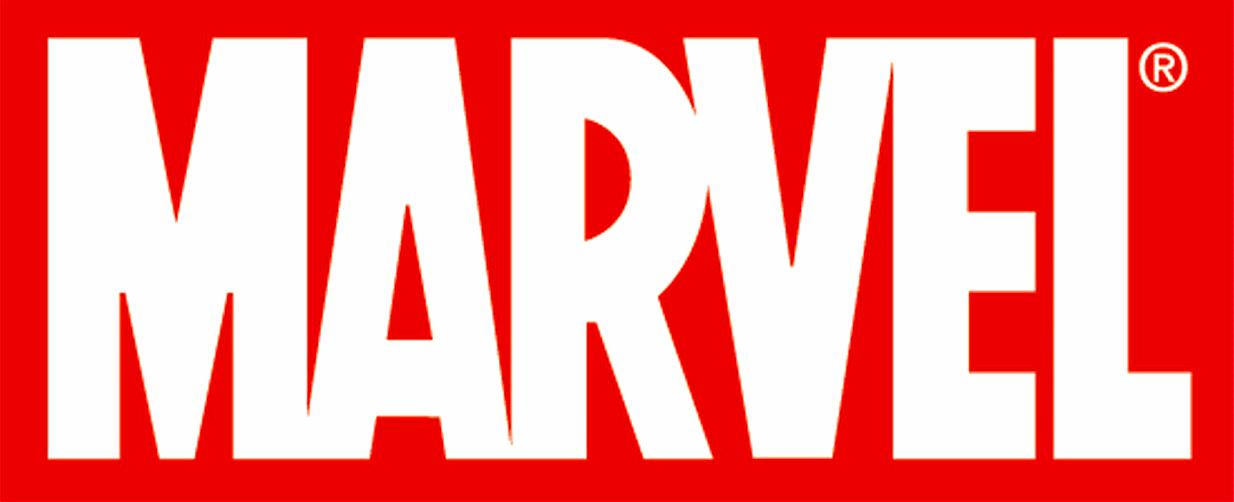 BUG: Yeah, they are the victims of all of you mustache twirlers out there.
BUG: Yeah, they are the victims of all of you mustache twirlers out there. JQ: Yes, yes. You know at the end of the day we are all sitting in an office like sweating it saying “Man, how do we tell the best story? Is this good enough?” That’s what we get paid to do and we also get paid at the end of the day to take the brunt of it too.
BUG: Everybody is screaming that he floppies are dying, they are all going to be wiped out and what’s going to happen with things moving to digital and that becoming more popular. What’s your opinion on the whole thing?
JQ: You know it’s hard to say. First of all I have to say I take exception to the term “floppy,” just from my own point. I think it denigrates what we do. There are original graphic novels, there are trade paperbacks or collected editions and there are single issues. What’s going to happen is hard to say, I think there will come generations that are going to enjoy reading this stuff digitally, but look when I started as editor in chief one of the places that Marvel was really behind the curve was with trade paperbacks. We had companies, DC and Dark Horse and Image that were just kicking our tails. They had a better library, a better backlist, and we were really behind the curve. One of the caveats to my becoming editor in chief when I was hired by Bill Jemas was I said “Look, I’m not going to take over this job unless we are going to start a trade paperback program. We are leaving money on the table.” And he was in agreement with me, so we became a force of two to push Marvel towards that direction. But once Marvel really jumped into the pool with both feet into the collected editions pool, there were a lot of people out there saying “This marks the end of the standard comic book, because now Marvel is doing it and everything is going to go to collected editions.” I was out there saying “I don’t think so.”
I think we have several different kinds of consumers in the world of comic books. We have the habitual, “every day I’m at the comic shop on Wednesday to pick up my comics,” consumer. We love those fans. Those are our hardcore fans and they support all of our brick and mortar retailers, but really if you look at it from a consumer standpoint that is a very unusual buying habit. There aren’t many things that I could think of that people would want to show up to a store on a weekly basis for get their fix of something. You know maybe if you are a fan of a band you might be, back when there were record stores, you’d be at a record store to be there when the album drops right? Most people don’t buy things that way. They buy things in a much more casual fashion. So then we have what I consider the casual habitual reader which is that person who will go into a book store and say “Oh, volume three of ULTIMATE SPIDERMAN is out, let me go pick that up.” And maybe they will go into a bookstore a month later and if volume four is out they will pick it up, but if not no worries, but they are more casual about their purchase, but when it’s there they have to have their fix. Then there are the people who are in between who are the comic reader who loves to go to the comic shop on Wednesday and pick up their books, but also likes to have a trade paperback collection they can go back to as reference points or reference book and low and behold we had a world in which people loved both of those formats and we have been living off of those formats for the last ten years, so now that digital comes in I’m not quite sure what’s going to happen.
Your gut would tell you “Well maybe in ten or fifteen years as more and more generations of kids are accustomed to reading things on their pads, maybe the printed book wont be as valuable,” but the one thing that’s missing from this, the digital version, is the collectability aspect of comics. By collectability I don’t want people screaming going “Oh my God, he’s talking about collectability,” I’m not talking about buying a comic to put your kid through college, because that’s just foolish. But every one of us is a collector of something, especially those of us who are comic readers. We are collectors in some form or fashion. For me, for example, my father bought me my very first Spider-Man book. I got that book tattered and torn in a plastic bag, it’s worthless to everyone but me, because it means something. It marks a particular point in time in my life that was very important to me and I’ve got several comics. I don’t have long boxes full of comics, but I have maybe ten or twenty comics that mean something to me and I think a lot of readers feel the same way. They hold on to certain books. So they are collectors. We are all collectors. That’s the one thing that the digital world really won’t enable you to do, because I don’t know what will happen. If we go completely digital what will happen in a show like San Diego? Will we be signing the back of iPads? I’m not quite sure yet where the technology I going to take us, so it’s an interesting world, but I think we will have a world in which both will exist. At least for some time and then we will see where it goes from there.
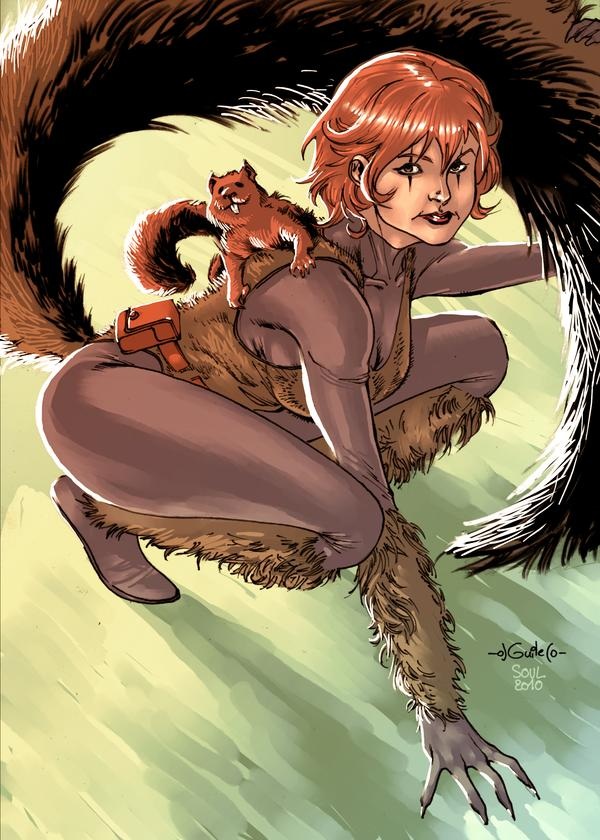 BUG: It seems like a really exciting time, but a scary time as well.
BUG: It seems like a really exciting time, but a scary time as well. JQ: Yeah, but look I mean the other thing to keep in mind is that there are people… while the direct market is incredible important to us, there are people who live hundreds of miles from comic book shops. I just met a fan from Oregon, I forgot to ask him where he gets his comics. I would venture to say he probably gets them via mail order. There are states that just have one or two comic shops in them, so I think the digital world is really important to reach out to people that don’t have access to this stuff. That I think is real boot for us.
BUG: Well as a question about some of the characters, but is there a character like a B list or a Z list character that you would love to see rise to an A list status in the Marvel Universe?
JQ: Squirrel Girl, man.
[Both Laugh]
JQ: Look, there are a lot of characters that I have a lot of affection for. I think a character like Dr. Strange could be really important, it’s just that he’s a nut that we have to crack, because there are certain characters that when fans see them they go “Oh man, I wish they could get their own title” and then when they do get their own title, we fail. I don’t want to say the fans aren’t supporting. We fail as creators to find something compelling in those characters that give people that same charge that they felt when that character came in as a supporting role and I think Dr. Strange is one of those characters. Magic has been a tough nut to crack in the Marvel Universe, because it’s such a practical universe, but I think we are going to get there. We’ve got some ideas brewing so Dr. Strange is one of those characters that I’ve always had a lot of affection for. Deathlok is a another character that I have a lot of affection for. When I see Jason Aaron’s version of Deathlok with Ron Garney, I go “Yeah, that’s it. That’s the stuff.” So you know… Nova, Nova is another character that… Guardians of the Galaxy, I think there’s something there for us and you know we will be taking a good look at those characters too as we move along.
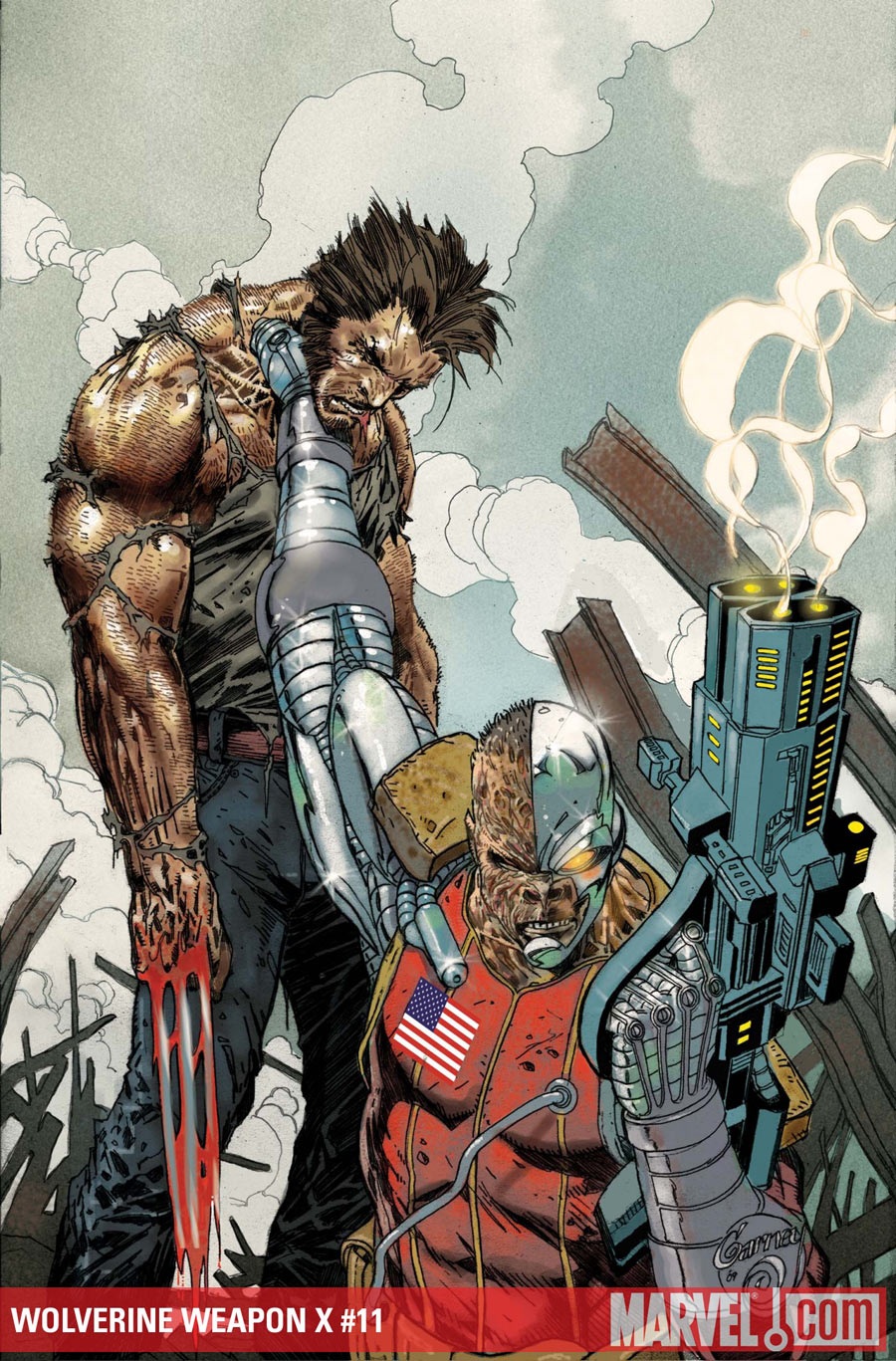 BUG: Well it seems like more so with Marvel books you are willing to take some of those chances with some of those more obscure characters, you give them a four issue miniseries or something like that. Even when there’s not the biggest demand for it you really have a good way of pairing up the right artist and the right author, how does that process work?
BUG: Well it seems like more so with Marvel books you are willing to take some of those chances with some of those more obscure characters, you give them a four issue miniseries or something like that. Even when there’s not the biggest demand for it you really have a good way of pairing up the right artist and the right author, how does that process work?JQ: There’s no spoon. Sometimes we may just feel like a certain writer has an affection for a character or might be perfect for a character. I think a prime example of this is taking a character like Iron Fist right? Iron Fist was arguably a C, maybe a D level character and here comes Ed Brubaker and Matt Fraction and they just have like a real… They have wood for this character right? And they take Iron Fist and they break up the mythology and they build it up and creates supporting cast and all of a sudden they have a character you go “Wow, there is real promise in this character that we didn’t see,” strictly because we had a couple of creators that came in with a real affection for the material and an idea. Mind you, that doesn’t work all of the time you know, it’s like black magic or alchemy, you just don’t know whether it’s going to create gold or it’s going to blow up in your face, but we keep trying. We keep trying until hopefully we have the right mix.
BUG: Writers who grew up reading comic books, like Marvel Comics specifically, do you think that’s better for them that they have grown up reading all of these stories or is it better just to come in fresh on these characters?
JQ: I’ve found that some of the more successful writers that we have had, and that includes editors as well, are people that have some distance away from it. I’m not saying that they didn’t read Marvel at all, but maybe dropped comics at some point, were lapsed readers, or went out to explore the world. I tend to find that people that have been… And this isn’t 100% true, but people that have been so engrained in comics that they have read them since they were able to read to the point where they hand in a submission, they tend to write stories that are a little bit too insular and are a little more hesitant to throw something against a wall to see if it bends or breaks than those of us… I was a lapsed reader. I read comics from the age that my father bought me my first comic, I was around seven or eight, till around the age of 12 or 13 where I discovered two very important things, baseball and girls, but not in that order necessarily. And then I dropped them and I did not pick up another comic book until I was 25 years old or 26 years old, so I missed out on a whole gap there.
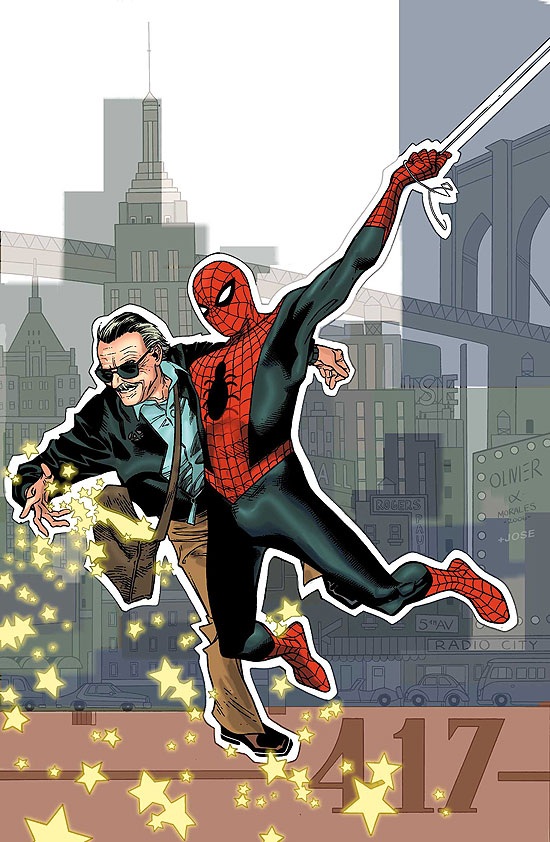 BUG: What was it that brought you back?
BUG: What was it that brought you back? JQ: Frank Miller’s DARK KNIGHT and I became a very heavy DC reader, because DC had all of the best writers at that time and as an artist me personally I would want to work with the best writers, because I want to draw great stories and eventually some day write great stories. So I missed out on that and that whole era of comics really in a lot of ways and I think that was very beneficial to me with respect to sort of looking at the Marvel Universe and loving everything that Stan did and that all of our predecessors did, but one of the sayings that we had at Marvel very early on in my tenure was “We don’t want to be writing love letters to Stan Lee.” Let’s face it, when Stan started all of this stuff and Steve Ditko and Jack Kirby and all of these guys started writing this stuff, they weren’t writing love letter to anybody, they were just looking out their window, seeing what the real world was like out there and writing stories for the real world. I think there was a period in time there at Marvel and even at DC where creators decided to look towards their own childhood and look towards the time when they really loved comics and write stories about that and to those creators as opposed to looking outside their window and saying “Well what’s the real world like out there?” and writing stories about that.
BUG: What comics, other than your own Marvel books are you reading right now?
JQ: Right now I’m reading very little outside of Marvel. I barely have time to read the Marvel stuff. I always get asked for pdfs to get sent to me and I through them on my iPad and I’ll try to read them every chance I get, but right now the significant portion of my time is spent reading movie scripts, drafts and ideas for some of our upcoming movies, a lot of animation stuff, and then the occasional big Marvel event I’ll look over a script here and there.
BUG: You have a giant Marvel Universe to look over, not a lot of time to look at other places.
JQ: And look we have some incredible people in editorial right now with Axel [Alonso] taking over, there’s very little for me to have to worry about. So you know I’ll step in from time to time, but unfortunately I don’t get to read as many outside comics as I dig. Every once in a while somebody turns me on to something and I’ll go look, but really there is hardly any time right now.
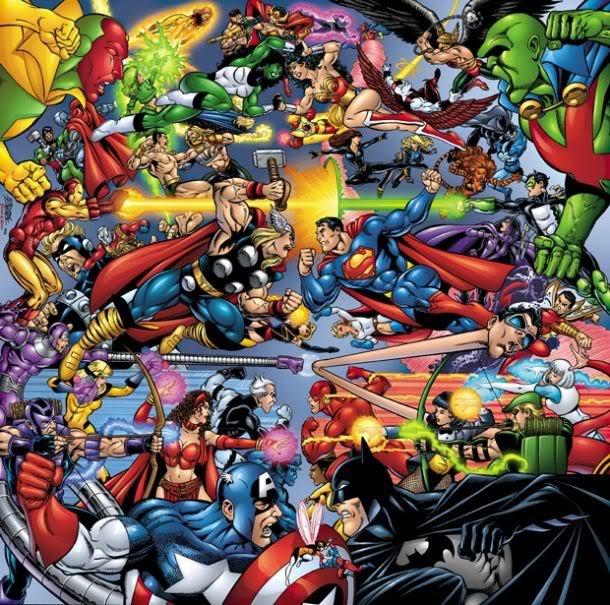 BUG: With you guys being on top of the heap, you’ve been on top of the heap for so long, but DC is always nipping at your heals. They are right there next to you guys, if not you guys kind of go back and forth there…
BUG: With you guys being on top of the heap, you’ve been on top of the heap for so long, but DC is always nipping at your heals. They are right there next to you guys, if not you guys kind of go back and forth there…JQ: Not really actually. We’ve been kicking their asses for ten straight years. They win a month a year every once in a while, but you know…
BUG: But with a competition like that, how do you keep Marvel ahead of the pack?
JQ: What we do is we never look back and we don’t worry ourselves with any of the competition, we just have to be Marvel and continue to be Marvel. You know I see so many companies out there, competitors trying to be Marvel when the truth of the matter is they should just worry about being themselves, so I know DC has got some really great and huge initiatives coming up and I wish them well, because if they are able to bring people into the stores, because let’s face it we have been doing it for ten years, so if they were able to bring some more people into the stores, that’s great for everybody, it’s great for retailers. So I wish them the best with this sort of stuff, but the truth of the matter is that every month we are going to be out there and we are going to be kicking their asses and I think the competition is great, I really do.
I have people who meet me and they are like “Wow, you’re not as much as a dick as you seem like when you are online” and it’s because when I started as EIC, I decided to create this role and this persona where I wanted a rivalry. There was way too much comfort between Marvel and DC. There was this peace between the two companies that I don’t think served anyone, because I remember during the heyday of it there were Marvel fans and DC fans and they were ravenous about both. I’m a big sports fan, you know? So it’s like I have a ten year old daughter and my ten year old daughter lives by one rule which is “You’ve got a cool dad and the day that you decide that you want to bring somebody home that you are in love with, I’m cool with anyone. You can bring home an axe murderer, just don’t bring home a Yankee fan.” I’m a Mets fan, okay? So I take that to heart and I think that rivalry is great and I love when fans are out there fighting about who is better “Marvel or DC?” Then they are not just passionate about Marvel, they are passionate about comics. So I created this persona where I went out there and I started poking DC and making fun of them and stuff and that’s the way it should be and they should be able to make fun of us as well, so competition is great. Let them get some stuff going. Again, I wish them luck, but we are going to kick their asses. So they’ll put out 52 #1s and we will continue doing the great stories we are doing and we will see where it goes.
BUG: How long have you been in the position that you are in right now at Marvel? About twelve years?
JQ: I had been at Marvel for a few years before I became EIC when I was doing the Marvel Knights stuff, so I have been at Marvel for about eleven years going on twelve yeah.
BUG: Looking back to that first year, is there any one thing that you learned that most important sort of nugget of wisdom that you have gained in all of this time?
 JQ: There were a lot of nuggets really, but I go back to what I said here before which is writing love letters to the past. You can’t do that and it became very, very clear to me when I would talk to Stan, because that first year I was on the phone with Stan a lot asking him about those early days of Marvel and how he approached things and the fact that there was no net, he was just creating. And this is metaphorical of course, but Stan would look out his window and look at the streets of Manhattan and maybe see a taxi cab pull out and see a heavy set woman maybe come out of that taxi cab struggling to get out of it and be kind of comical and he would think to himself “Wow, what if Thor came flying through here and he was fighting Galactus, what do you do with that situation?” Flash forward 40 years and you have writers saying “Hey remember that story about that heavy set woman coming out of the cab with Thor and Galactus? Let me right something just like that” as opposed to looking out their window and saying “Well what’s out that window now?” That was a very valuable lesson I think for everyone to learn, which was to write forward, just write forward and write about your experiences. Then we’ve always taken that to heart, so that’s been significant. You know I always put myself in the position of if Stan could get into a time machine, if it was 1964 and he could get into a time machine and go to the year 2000 or 2001 which is when I took over, would he be surprised that we were still telling stories in that same fashion or would he appalled that we didn’t move beyond that? I think Stan would be appalled and I think Stan is pretty happy with the way that Marvel has turned out in these last ten years and he’s still as brilliant as always and always a fountain of wisdom, so I learned a lot that year with him.
JQ: There were a lot of nuggets really, but I go back to what I said here before which is writing love letters to the past. You can’t do that and it became very, very clear to me when I would talk to Stan, because that first year I was on the phone with Stan a lot asking him about those early days of Marvel and how he approached things and the fact that there was no net, he was just creating. And this is metaphorical of course, but Stan would look out his window and look at the streets of Manhattan and maybe see a taxi cab pull out and see a heavy set woman maybe come out of that taxi cab struggling to get out of it and be kind of comical and he would think to himself “Wow, what if Thor came flying through here and he was fighting Galactus, what do you do with that situation?” Flash forward 40 years and you have writers saying “Hey remember that story about that heavy set woman coming out of the cab with Thor and Galactus? Let me right something just like that” as opposed to looking out their window and saying “Well what’s out that window now?” That was a very valuable lesson I think for everyone to learn, which was to write forward, just write forward and write about your experiences. Then we’ve always taken that to heart, so that’s been significant. You know I always put myself in the position of if Stan could get into a time machine, if it was 1964 and he could get into a time machine and go to the year 2000 or 2001 which is when I took over, would he be surprised that we were still telling stories in that same fashion or would he appalled that we didn’t move beyond that? I think Stan would be appalled and I think Stan is pretty happy with the way that Marvel has turned out in these last ten years and he’s still as brilliant as always and always a fountain of wisdom, so I learned a lot that year with him.BUG: Well thank you so much for taking the time with me. I appreciate it. It was great talking to you.
JQ: Any time.
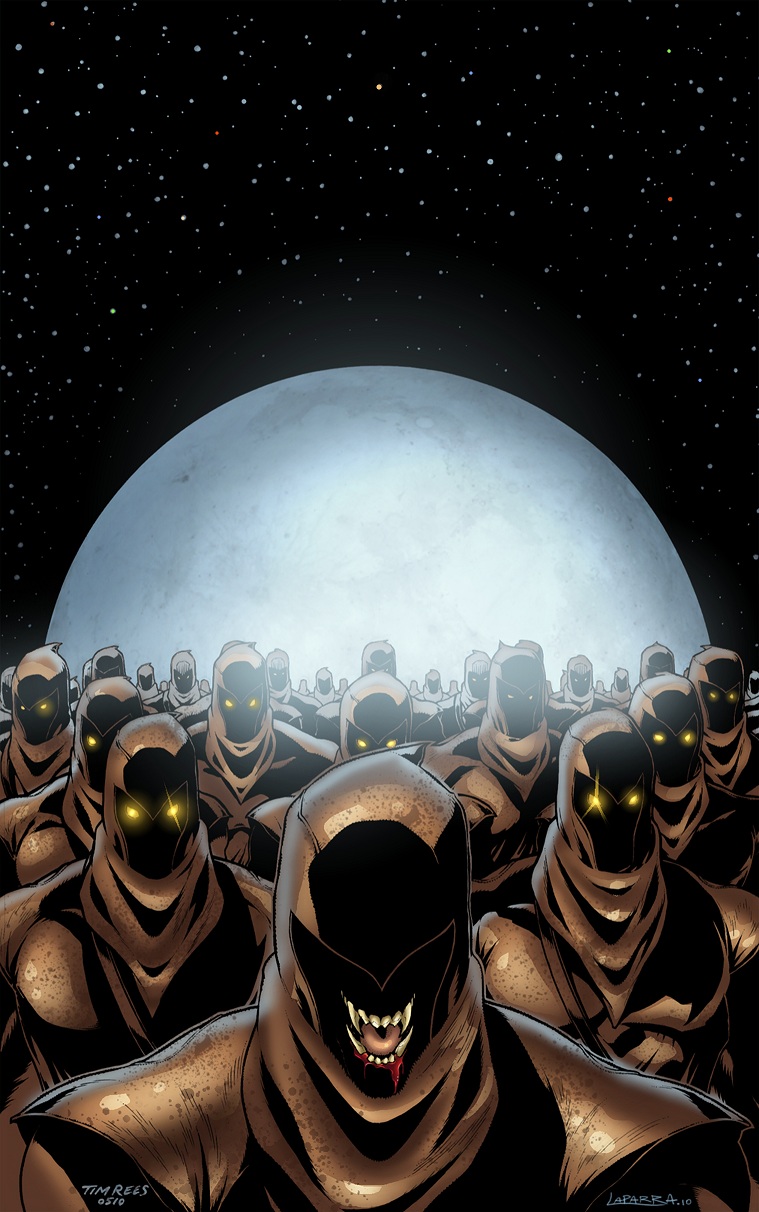 Ambush Bug is Mark L. Miller, original @$$Hole / wordslinger / reviewer / co-editor of AICN Comics for over nine years. Mark is also a regular writer for FAMOUS MONSTERS OF FILMLAND and will be releasing FAMOUS MONSTERS first ever comic book miniseries LUNA in October (co-written by Martin Fisher with art by Tim Rees)! Support a Bug by checking out his comics (click on the covers to purchase)!
Ambush Bug is Mark L. Miller, original @$$Hole / wordslinger / reviewer / co-editor of AICN Comics for over nine years. Mark is also a regular writer for FAMOUS MONSTERS OF FILMLAND and will be releasing FAMOUS MONSTERS first ever comic book miniseries LUNA in October (co-written by Martin Fisher with art by Tim Rees)! Support a Bug by checking out his comics (click on the covers to purchase)!

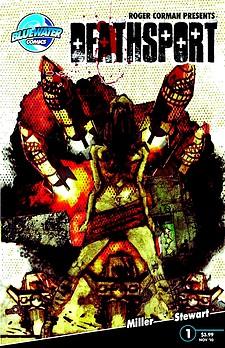
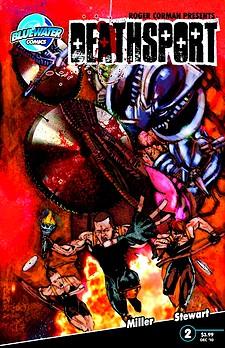
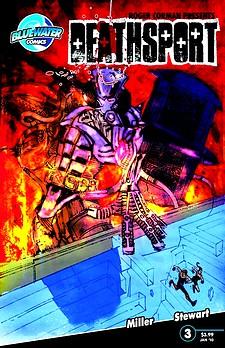
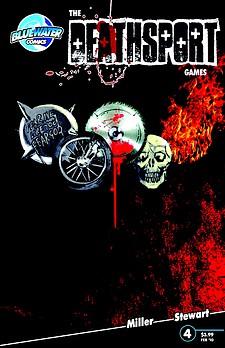
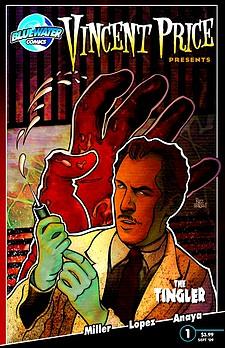
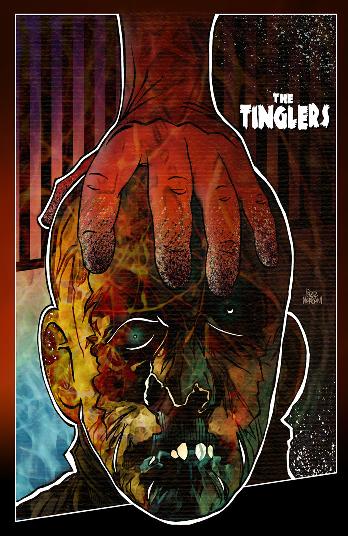

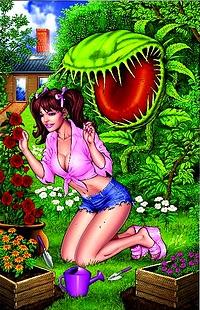


Check out NANNY & HANK’s Facebook Page
Check out THE DEATHSPORT GAMES’ Facebook Page
Proofs, co-edits & common sense: Sleazy G
Check out Bug’s panel Horror on the Paneled Page in its entirety from the con!!!
Ambush Bug announces his new werewolf comic LUNA on FAMOUS MONSTERS panel!!!
SJimbrowski brings back a ton of webseries news from Comic Con—Felicia Day’s DRAGON AGE REDEMPTION! MORTAL KOMBAT! & Bryan Singer’s H+ THE DIGITAL SERIES!
Keep an eye out for more interviews and special reports from SDCC 2011!
